
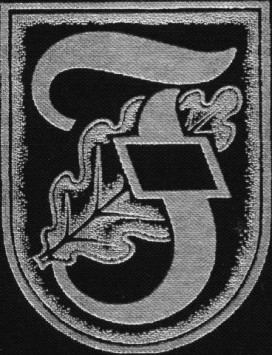
Interview with Hans von der Heide, Unterscharführer in the 10. SS-Panzerdivision 'Frundsberg', USA, 1990.
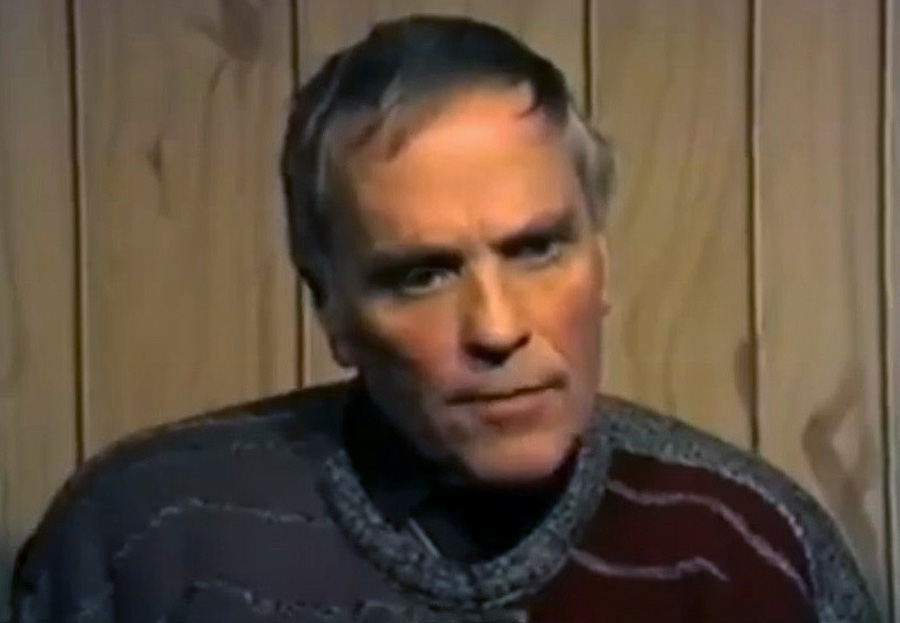



Interview with Hans von der Heide, Unterscharführer in the 10. SS-Panzerdivision 'Frundsberg', USA, 1990.


Hans: Yes, I came to the Waffen-SS later in the war, and was transferred over to the 'Frundsberg' division. I was a young idealist who wanted to serve my country as soon as possible. I tried to enlist in the SS in 1941 at 17, but was not allowed in. It was not until I turned 18 that I received a draft notice. I was able to enter the Wehrmacht very easily with the physical exams and background checks. Training was hard, and many of the NCOs had already been in the war, so they knew what they were doing. Training was a lot of focus on stamina and mental sharpness. They would give us extra chores or exercises if we messed up. There was a big focus on paying attention to the little things, they stressed these would keep one alive.
After this training I was assigned to 88 flak guns [88 mm anti-aircraft and anti-tank artillery gun] in France to protect France from bombers. The bombers were starting to attack France, Western Europe, as well as Germany. I saw the aftermath of the bombing of French towns and felt bad for the civilians. After a short service time in the flak I was told I was being transferred to a new Waffen-SS division and would begin training for eventual deployment to the eastern front in 1943. I was happy to have been taken by an SS division. I considered the SS as a very elite and loyal German vanguard of a new age. It had been noted in my file that I had applied to the SS before so that was one reason I was picked.
Our commander was Lothar Debes, and he made the rounds everyday to see how we were making out. He made sure we had good morale and often allowed sports events, plays, and outings. I was proud to wear the sig runes on my tunic and my helmet. I was issued a M40 helmet with a single decal that was silver with black runes.
As I strolled through French towns I felt I belonged to a very strong and elite army. The people did not fear us at all; they freely would offer snacks and treats to us young soldiers. There was an old woman widow who would bake pies for us every weekend. The mass media makes it seem like they all hated us today.
You served on the east front, how did you see the Russian soldier and the civilians?
Hans: We viewed the Russian soldier as a good soldier mostly, he was willing to die for his country and mostly brave. I do not believe they treated German soldiers fairly, and it is said they committed many crimes against German forces. I will say the treatment of Germans seemed to be different between certain Russian units.
Some seemed to be ready to shoot surrendering soldiers, where others did not. We had strict orders to take every prisoner as we needed the intelligence. Once captured they willingly would spill the beans on what was happening. Many times they helped us prepare for attacks. In some sense we felt sorry for them as their leaders sacrificed them needlessly on frontal attacks that were easily broken up.
Often times our surgeons treated the wound and not the uniform, this is not spoken of today. I saw many times wounded Russians being taken care of by our medical people. I only saw one time where a trigger happy grenadier shot a Russian who had his hands up to surrender. I must say the day before some tried a trick to fake surrender so a sniper could shoot at us.
As for the civilians, we got along with them well and treated them very good. They allowed us to live with them and would offer us home cooked meals often. Some men even took girlfriends if time allowed, but they had to be careful not to go absent too long. This happened often, with light punishment.
The partisans were the only people we had problems with; they were quite cruel and sadistic. There were many times in the east, and the west, I saw the results of partisan warfare. They would shoot at German soldiers while hiding in buildings, and kill anyone that helped Germans.
Later in the war this made it hard to trust the people as partisans would hide in friendly villages, forcing the people to aid them.
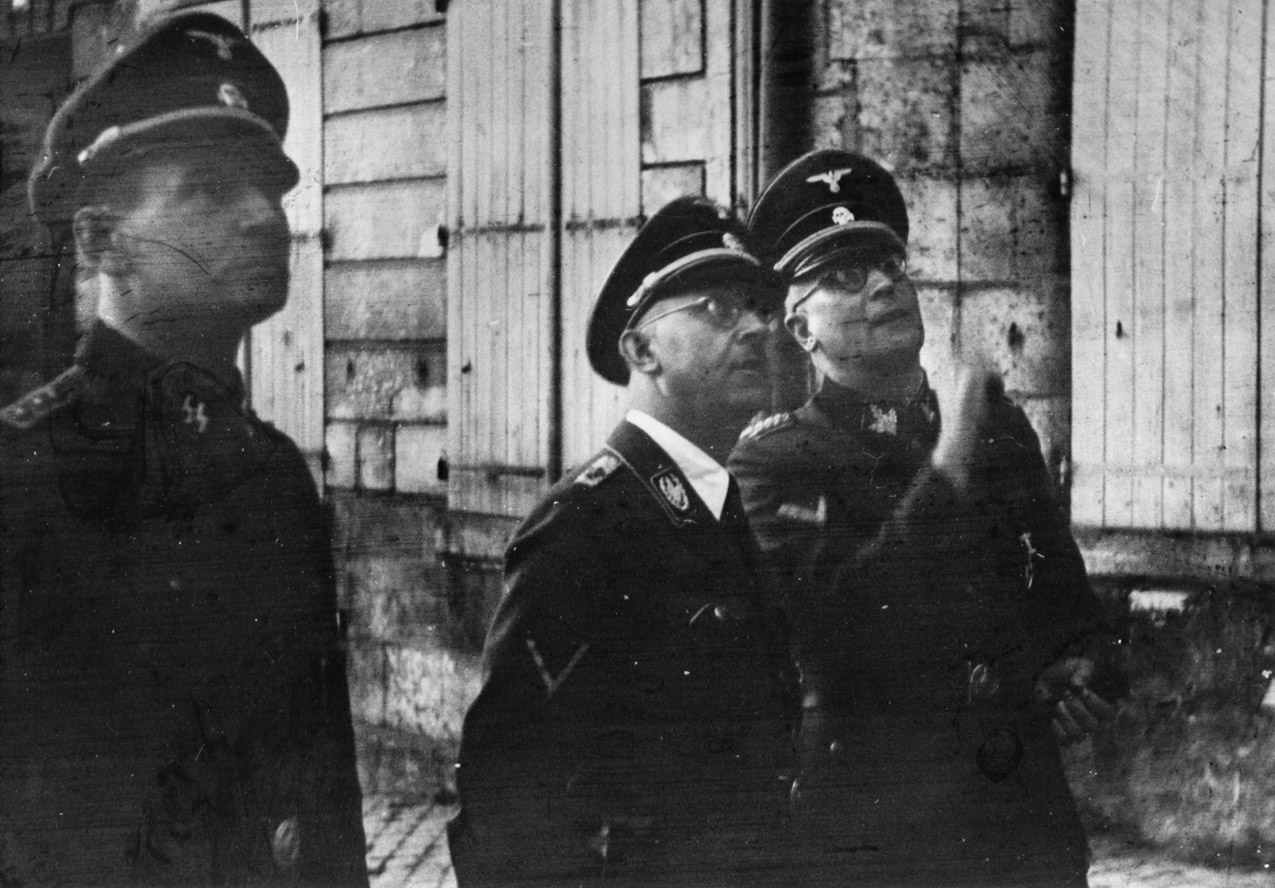
[Above: Reichsführer-SS Heinrich Himmler (center) standing beside Lothar Debes (right) and another unidentified SS officer.]
Hans: I saw a few examples of the way they fought. They would cut lines, cut trees, or seize small villages and then wait for someone to come. Then they would kill them, but at times they mutilated them to send a message. I saw two comrades who were bringing supplies to our camp ambushed, and while wounded had their throats cut. Another scene was young soldiers had been shot in the back of the head, stripped naked, and had their genitals cut off. We could not figure this hatred out, but it had to be the anti-German propaganda that the reds put out. They told everyone we were killing women and babies so it was okay to get revenge.
This was false, but it encouraged these red partisans to commit great acts of terror. They even did this to their own people, so much so that the Ukrainians formed militias to fight them as well. These battles alone were very bloody, I saw some prisoners they brought in and they were dirty and bloody. The militias were mostly our allies and did a good job of combating the partisans. We were not on the east front very long, as when the Normandy landings happened we were sent west to face the Allies. We faced the same type of war in the west regarding partisans, except they were the resistance. They were led by Allied operatives, and did the same tricks, cutting lines, closing roads, and taking shots.
When they were caught we turned them over to the police or local militia who would deal with them. I will say that I do not want to give the impression these groups were large, they were not. We rarely had to deal with them, but it did happen. Mostly one could travel freely with no problems. As we discussed, sometimes their actions were very organized and had the support of a village. I saw this in the east where women partisans had attacked German units and informants told the police who did it. We went into the village and a survivor pointed out those he saw help. They came out begging to be left alone.
We searched the huts and found illegal military weapons, not just shotguns, which were allowed, but machine pistols. Their huts were destroyed and the women were seized by the police, they wailed and threw fits. One comrade found a picture of a rabbi in one hut. Our leader worried where the men were, it was surmised they were off fighting as well. We found out later that these were Jews and the men already died fighting German and militia units. One of the loudest even tried to hide she was a Jew by holding a rosary up, hoping that would free her. While I was a prisoner I was with a few soldiers from the Leibstandarte, the Führer's bodyguard. They told of the same stories during the Battle of the Bulge. In Belgium, the Allies were successful in setting up bands who carried out attacks on German units. They sent arms, ammo, and explosives to use against us.
They talked about the recklessness of these people, they would shoot out of a window of a fully occupied home, just thinking the soldiers would keep moving since they were retreating. They did not understand the laws of war, their house would be leveled, and all in it. One soldier spoke of a time that a man shot at a truck, hitting a LAH [Leibstandarte SS Adolf Hitler] soldier in the thigh, they stopped and returned fire as the man ran away to a garage, and they threw in grenades. To their horror and anger, he ran to his family who was hiding, and they all died. I tell you this because there are accusations against the SS claiming we killed many civilians, I believe there is much more to the story. We did not go around shooting at anything, unless it shot at us first. We had to conserve ammo and civilians were not our targets. In the east and west we wanted to make a good relationship with the people. If they were kind to us, we were kind to them, if they ignored us, we ignored them, if they attacked us, we attacked them.
Any German reprisal was just that, it was a reaction to an initial action. While it is written that the partisan war was bloody, it was only bloody because the red partisans made it that way. I feel no sympathy for someone who is not in the military who commits an act of war.
They have a very sympathetic press who has treated them as heroes, yet in truth they were common criminals who followed a political agenda. When they were caught and faced punishment they became whiny cowards.
You fought in both Normandy and Arnhem, how did you view the Allied soldiers and what action did you see?
Hans: With great admiration, they seemed to have unlimited supplies while we did not. Their power awed us all, General [Wilhelm] Bittrich said how great the Allied air fleets alone were. Frundsberg was moved to the frontline to defend hilly land against he British. They had unlimited artillery and bombs to throw at us.
Our orders were to hunker down and defend our hill. We had well hidden anti-tank guns and rocket launchers. When they had the ammo they could give Tommy a beating. I had my first Panzerfaust and tried to hit a Cromwell [British tank] but missed. Other comrades were successful and scored hits leaving me embarrassed.
We held up the British until being outflanked and forced to retreat in late July. I was lucky to get out with only minor wounds; they trapped many men in the Falaise pocket. We retreated east towards the Reich, but surprisingly I did not feel like we were beaten, I thought new things would happen to help us win.
I felt we were better soldiers than the Allies, and fought for a higher cause defending Europe. They were here to destroy Europe, that's why so many non-Germans came to the SS. They understood what we were fighting for and wanted to defend their freedom.
My division was eventually sent to Holland to refit and rebuild. It was during this time the Allies dropped [parachuted] at Arnhem [city in Netherlands], which was a disaster for them.
We knew something was happening as they were flying over us often and strafing the roads. A farmer who brought our company milk everyday was killed by a plane strafing him on his way back home. I remember seeing the landings, I saw the parachutes in the distance and we were told to 'alarm march' to the zones.
We heard gunfire all around, but had no idea what was happening. Our leaders formed holding perimeters to contain the landing zones, and others moved into Arnhem to drive out the enemy. On our way to the town our leaders told us to be very careful at what we shoot at, as civilians were trapped and being used as shields.
There was to be no needless destruction unless occupied by the enemy and receiving fire. Arnhem was not damaged very much by our recapture, but it was bombed or shelled by the Allies at the start, I remember that Nijmegen [the Netherlands] was also hit hard early on. Then after the war all you saw was pictures of destroyed buildings that the description said were destroyed by Germans.
I saw my first British prisoners here and they were mostly pleasant and seemed like good soldiers. This battle reminded me of what I read during the 1940 campaign, friendly prisoners who were glad to be out of it. I think they were really surprised we beat them, as they knew victory seemed very close. We treated them well, and quickly moved them off to camps.
I remember there were air drops made so we could give them medicine and food, which we were low on. They thanked us for the good treatment and I heard some say they did not expect it. Their propaganda was saying the same thing as in Russia, that the SS killed everyone.
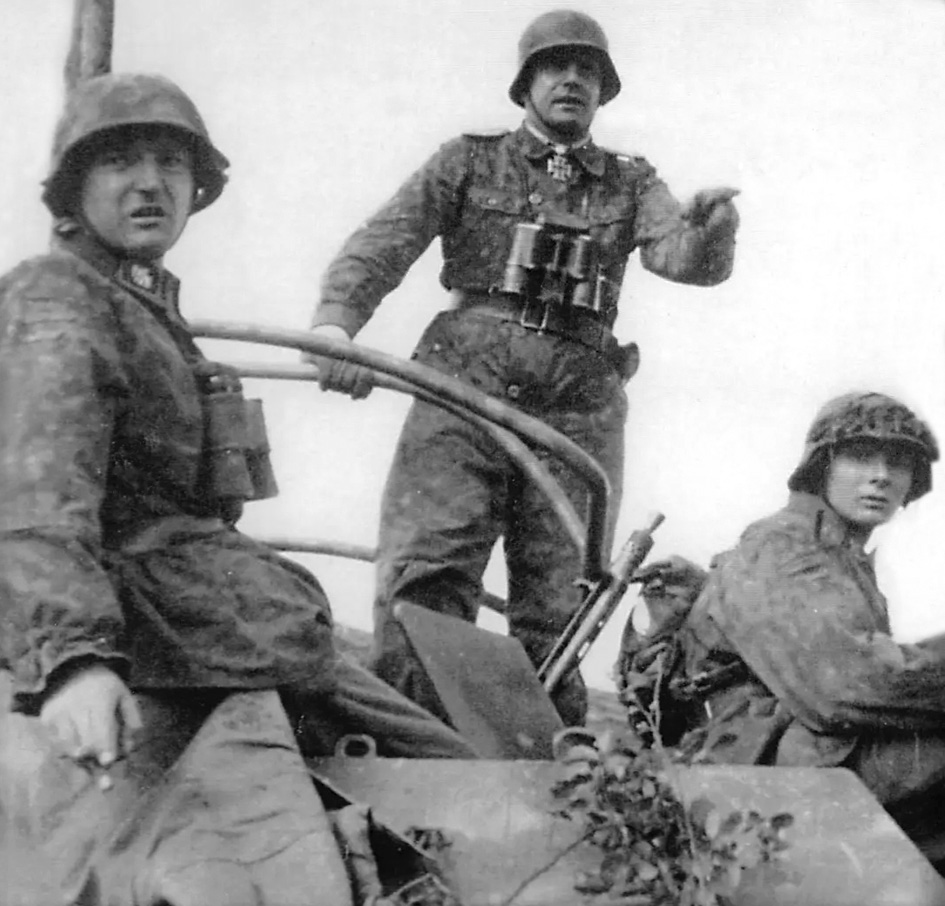
[Above: Men of the 'Frundsberg' Division.]
Hans: For me it shows the power of propaganda, the people were told this and after the war it kept growing. I am called a Revisionist because I refuse to believe the Allied version of events. Some historians call me a Nazi apologist, they only know what they have been taught and they don't have the mindset to think critically and see all sides. To these types the truth is a lie. As I told you in the Belgium example, a family was killed due to the illegal action of one man, yet I am sure after the war the Allies went looking for who threw the grenade. I was told of examples like this in Italy also, it was a lone fanatic who drew the fire of soldiers and got innocent people killed.
I served on the front and know that no innocent civilians were killed by SS men on purpose. We had strict orders to be fair and humane, so much so that the reds took advantage of this. The Russians have claimed an overblown death toll to 'prove' our guilt, yet in truth they killed countless people after the war who worked for us. I heard about the masses of Eastern Europeans returned against their will, what do you think happened to them? There had to be several million all over the occupied areas. I saw Polish and Russians in France working as willing laborers. During my time in France a comrade had a love affair with a pretty Ukrainian girl; she was with a large group working in a factory. I remember they snuck off to a lake to swim and he took scantly clad photos of her and shared them with us. One of the girls was arrested for trying to threaten the French family she was staying with.
It was the talk of the company. She lived with this couple who had a nice house nearby. She was sleeping with the husband, and then demanded he pay her a large sum of money. When he refused she attacked him and threatened to kill his wife. Last we heard she was sentenced to a long time in a concentration camp.
I will tell you I am saddened to see the wartime accusations have not died. I thought after Reagan visited Bitburg [Germany] a few years ago that it would calm things down. All this did was fire up the Jews to tell even more untrue stories. The ignorant masses just eat them up without batting an eye.
The entire Waffen-SS was an all-volunteer army that took men from all over Europe; many were indeed faithful to Hitler. This is in no way a crime; it made us better soldiers who knew the stakes of what the fight was about. This made us dangerous to the Allies, and they feared fighting us.
On that note, can I ask you why so many SS men turned on each other and supported the Allied claims of war crimes?
Hans: Yes, for me this is easy to answer as I have met many former soldiers whom confirmed this. The small and large incidences like Malmedy, civilians, etc., were investigated by the winners. For political or national reasons, hatred, or just simply not understanding what happened, people lined up to claim victim status.
They said they were eyewitnesses and aided the investigators in putting together a picture based upon a lie or misunderstanding. The investigators then turned their work over to former German Jews or communists who worked for their interrogation teams. This is no exaggeration; many Jews who left Germany went on to serve in the Allied intelligence branches.
I have read many of the affidavits containing these interrogations that have been released.
At war's end, all we wanted to do was go home and see our families, these people played on what these young men wanted. They used scare tactics to make them think they would be hung if they did not agree with eyewitness accounts.
I know they helped the boys with their stories, telling them just agree and cooperate and they would only get a few years, otherwise they would hang. So what would you do? Many of the scared and confused young soldiers went along with the Allies, some, it's true, did not even need much to turn on comrades. They had problems with comrades during the war and turned on them after, to the delight of the victors. Not many SS men did this, but enough did to add fuel to the lies.
A comrade told me after the war that he was accused of shooting French men on his way to Normandy. He said their train was fired on and an attempt was made to blow the tracks. A group of men were seen running off and a chase led the Germans to a small village.
A shot rang out from a house, and a gunfight ensued with more Germans arriving. A few more men joined, but when seeing the village was surrounded they gave up. A search of the homes of the men revealed Allied arms and propaganda, along with fake money. They were clearly Maquis [a communist terrorist organization supported by the Allies] and were shot as per wartime law by the police and Milice [the Milice Française (French Militia) was created by the Vichy regime to combat the communist terrorists, otherwise known as the Maquis.].
Witnesses said it was SS soldiers, so he was guilty by association. This young soldier was going to be hung by the French; their logic was Eisenhower had declared that all Maquis were legal fighters, so it was a crime to shoot the men.
He had to resort to say that he was only obeying orders and would have been shot if he refused. Due to this he was allowed to live, with the sentence eventually being changed. My comrades were so abused after the war that it has forced many to stay quiet as not to open these old wounds. Many are very afraid to say anything of the truth, I feel as I have nothing to lose. I want people to hear our side and make their own conclusions.
[Above: A mighty Panther of the 10.SS Panzer Division 'Frundsberg' Division. Note the distinct 'F' division symbol painted on the back of the tank.]
[Above: Cuff title of the 'Frundsberg' Division.]
[Above: A martyr of 'Frundsberg'. An invader's bullet has found its mark. He has died defending his people from the dark fate that we are seeing unfolding today.]
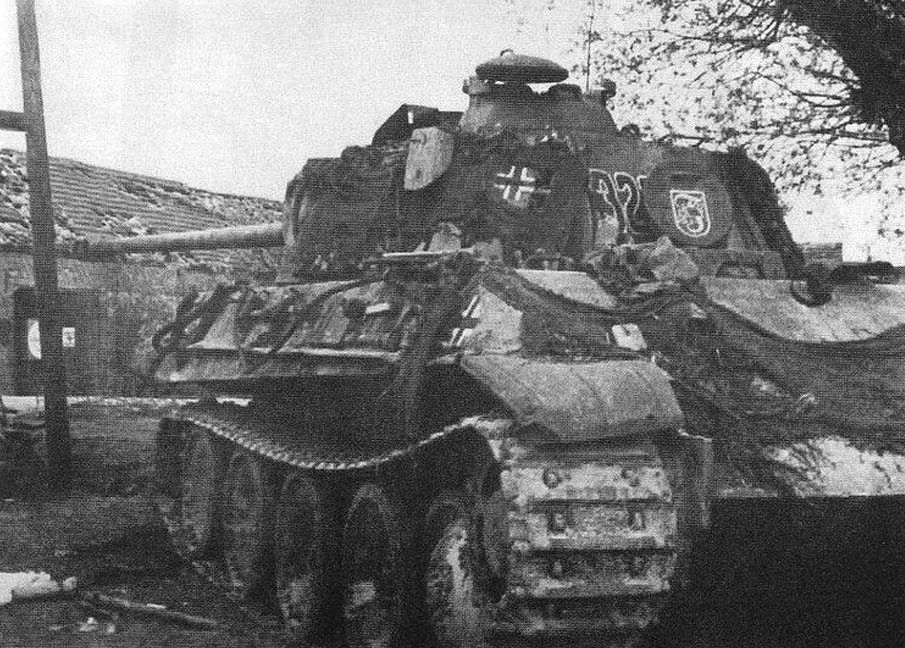

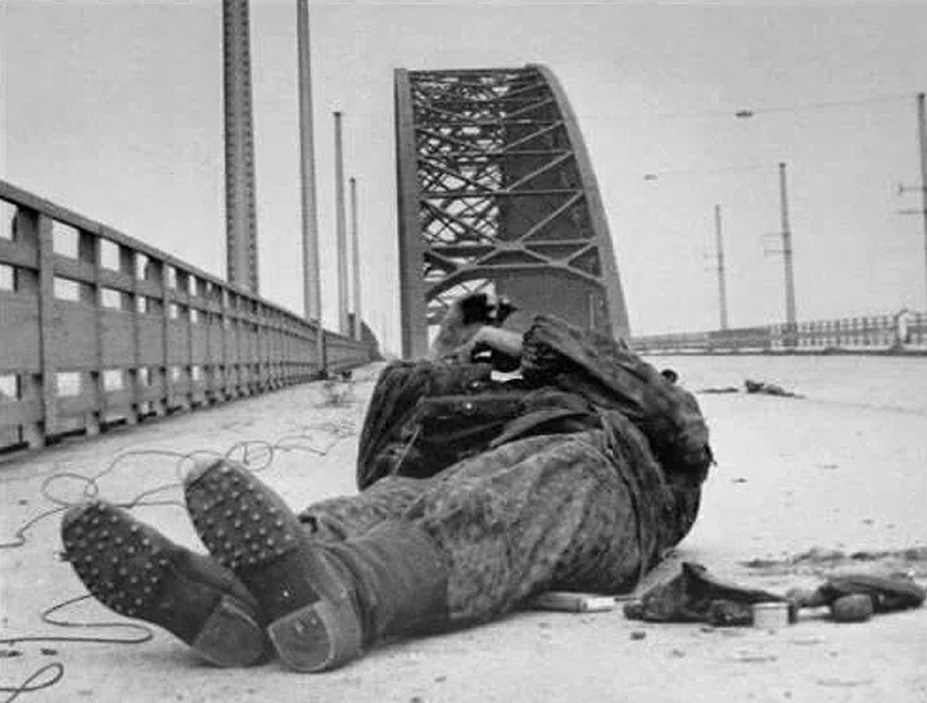
by Hans von der Heide here
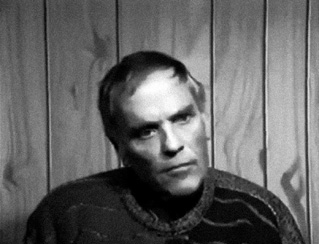
Back to Interviews